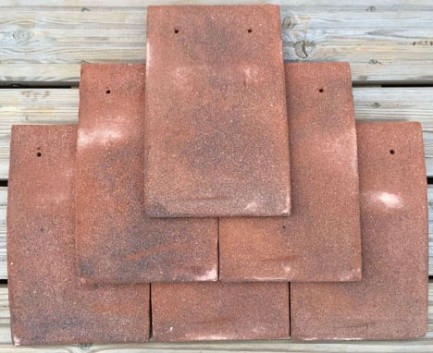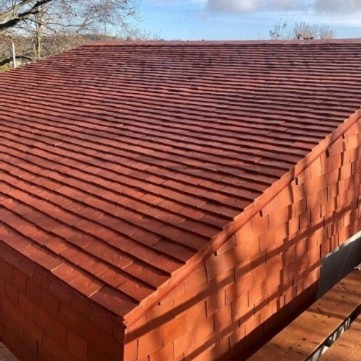Traditional roof tiles in Suffolk
Heritage Tiles: Emblematic of the finest craftsmanship
Heritage tiles are the professional roofer's choice for the highest quality clay roof tiles. We pride ourselves in manufacturing, stocking, and delivering the very finest in prestige clay roof tiles.
Heritage Tiles have several tile ranges that satisfy every architectural requirement. Vintage and historic properties right up to modern new builds are covered by the diverse range of clay roof tiles that we stock.
So, whether you are in the building trade, or simply wish to choose your own tiles, Heritage Tiles have the right product for your specific requirements.
What Heritage Tiles have to offer our customers?
- We offer specification and technical solutions to help you achieve the perfect build.
- We also offer expert design advice to all our customers.
- We are happy to engage in site visits with our clients.
- We have stockists and distributors throughout the United Kingdom to ensure that we can provide our expert service to a wider area.
- We can provide estimated quantities from plans supplied by our clients.
- We offer battening plans.
- We can deliver a standard and bespoke colour choice for our clay tile products.
- All our tiles are assessed and approved by Lucideon.
- We provide a nationwide delivery and collection service.
The ranges of clay roof tiles we supply.
The Clayhall Range of roof tiles:

Clayhall Medium Blend - Carefully crafted to replicate all the features of handmade the Clayhall hand crafted range of tiles offers an excellent alternative when budget restrictions are a concern, but without compromising quality or durability.
Clayhall Dark Blend - Quality and durability in a budget clay roof tile. The Clayhall dark blend is sure to turn heads.
Clayhall Red Blend - A beautiful rustic clay roof tile. The Clayhall red blend is a firm favourite with our customers.
Clayhall Hamlet Mix - The Clayhall Hamlet mix is a gorgeous light and sandy looking clay roof tile that is a perennial favourite in the building trade.
Clayhall Birchwood Mix - The Clayhall Birchwood mix offers a gorgeous blend of lighter and darker shades in this diverse clay roof tile. If you are concerned that your roof tiles could look monotonous, the Clayhall Birchwood mix is the clay roof tile to choose.
The Conservation Range of roof tiles

The Conservation range of roof tiles are available in a range of distinctive colours, created by using a very fine sand, The Conservation Weathered; A natural warm tone, achieving an instant mellow and settled look and The Conservation Red; perfect for vertical tiling especially suited for villages and hamlets with olde world vernacular charm.
Manufactured using high quality clay, achieving high strength and durability properties, giving homeowners and contractors peace of mind for many years to come. The conservation range comes with a complete set of associated fittings, including Hog Back Ridge, Half Round Ridge, Bonnet Hips, Valley tiles and External Angles.
The Conservation range of clay roof tiles comes in the following variations:
- Conservation Red
- Conservation Weathered
- Conservation Dark
Conservation Peg Tile
Plain clay roofing tiles laid to a double lap have been used for roof covering in England since before the Norman Conquest and tiles dating back to Roman Times have been discovered under excavation. From the outset clay plain tiles were made incorporating fixing features.
The Classic Edwardian roof tile
The Classic range of plain tiles is one of the finest ranges of clay tiles.
We source only the best raw materials for our craftsman to create beautifully handmade clay tiles of the highest quality and durability.
Tile Fittings available from Heritage Tiles
There are many fittings that are available from us a Heritage Tiles to complete your build to perfection. We stock and supply the following:
- Gable Tile
- Eave Tile
- Baby Porch Ridge
- 90 Degree Ext. Angle
- Universal Bonnet Hip
- Half Round Ridge
- Hogs Back Ridge
- Mono Ridge
- Third Round Ridge
- Universal Valley
- Ornamental Club
- Bat Tile Set
Bat Tiles:
Provide help for our bats with our range of bat friendly roof tiles.
Did you know that all UK bats and their roosts are protected by law? The Wildlife and Countryside Act introduced in 1981, gave legal protection to all bat species and their roosts in England.
Distinct species of bats prefer differing places to roost. The two most usually found species of bat in the UK are the Pipistrelle and Brown Long-Eared Bat. Pipistrelle prefer confined spaces such as under tiles on roofs and hanging spaces. The Brown Long-Eared Bat prefer roof timbers and ridges inside lofts. Heritage Clay Tiles can provide purpose made access points within your roof tiles or ridge tiles. The Bat Tile Set can form part of a mitigation package required by law for existing roosts or as potential access where a roost had not previously been present.
Select a Blend
Getting the right blend for your roofing project can feel daunting, but with our blend generator you can mix and match various blends of tiles to achieve the perfect blend.
Click here to make use of our online tool to choose your own unique blend.
Because our strict quality control provides a consistent tile size you can mix assorted styles and colours of tiles to make your roof unique to you. Please use the tool below to experiment with various blends.
Adjust the sliders to set the ingredients for your desired blend then click on the update mix button.
Alternatively click on any blend or tile to display it.
Whatever type of clay roof tile you want, Heritage Tiles will be able to help.
Traditional roof tiles
Reclaimed traditional roof tiles
Using reclaimed traditional roof tiles is a great way of saving some money and doing your bit for the environment too. Not only that, but although traditional roof tiles will have been cleaned prior to sale, they will still have an aged patina that is very desirable for many traditional properties. Often, brand new tiles, even traditional roof tiles, can look a little out of place on a period property, so reclaimed traditional roof tiles are a great way to achieve that aged but beautiful look.
Traditional roof tiles: Get the look, but stay green
Traditional roof tiles have been used for roofing for many thousands of years, and people still choose them above the many other alternatives available. This is testimony enough to suggest that traditional roof tiles were, are and will always be the number one choice for the perfect looking and performing roof.
Reclaimed traditional roof tiles are the most eco-friendly option for any roofing project. A property with a Spanish design matches perfectly with a standard curve of red clay tiles whereas traditional roof tiles equally complement the look of historical properties. In other words, traditional roof tiles will do justice to virtually any type or style of property.
Traditional roof tiles are natural but incredibly durable. They can last over a hundred years. Traditional roof tiles are fire proof, rot proof and are not subject to pest damage either.
Traditional roof tiles from Heritage Clay Tiles Ltd can last longer than the building
Traditional roof tiles often outlive the building where they are first used and are commonly recycled. Sometimes, traditional roof tiles that are on a historic or famous building are stripped and replaced. The great thing about this is that you can buy into a little slice of history, do your bit for the environment by recycling, get a beautiful roof and save some money at the same time.
Traditional roof tiles are made from natural clay and are incredibly energy-efficient, recyclable, and long-lasting. They are available in a variety of colours and interesting styles, making them the perfect choice for builders and homeowners.
Some signs that your roof needs replacing
While traditional roof tiles can last for many years, there are a some signs that indicate it may be time for repair or replacement.
The most obvious sign is when you notice cracked, broken, or missing tiles. Any damage to your traditional roof tiles can lead to leaks through your roof.
Should your traditional roof tiles be very old, the porous body of the tile may become exposed to rain, snow and thus allow water to seep through to the roof below.
It's a sound practice to have your roof inspected every couple of years. It's a quick and relatively cheap job to have done. You may be in a position to do the inspection yourself, particularly if you live in a bungalow. This allows the identification of minor issues before they become major repairs. If you notice several damaged tiles, any deterioration underneath tiles, or persistent leaks even after repairs, it may well mean that the whole roof needs replacing.
Replacing traditional roof tiles
Replacing a traditional roof tiles is a big job but when you consider that you will be adding many years of life onto your home, it becomes worth the effort and expense. Remember that if you are selling your property, a damaged or sub-standard roof can potentially knock many thousands of pounds off of the asking price. Also, remember that traditional roof tiles in conjunction with modern installation methods can result in roofs that can last much longer than the original.
Maintaining Heritage Clay Tiles Ltd traditional roof tiles
With the proper care and maintenance, traditional roof tiles can last many years. By observing a few common sense practices, you can substantially increase the life span of your roof.
A regular inspection of your roof can save you a lot of time and money. Look for cracked, loose or missing tiles, deteriorated flashing and any signs of leaks.
Clear any accumulations of debris such as leaves, branches and other debris from the roof and gutters.
Prune any overhanging trees to prevent them causing any damage to your traditional roof tiles.
Repair any leaks promptly, as a small leak can lead to extensive water damage.
Re-coat traditional roof tiles at approximately ten year intervals. Re-coating traditional roof tiles with a good quality roof tile sealant will protect them from weathering and prevents further leaks.
As the old saying goes, a stitch in time saves nine. With the proper maintenance and care, your traditional roof tiles will provide many years of protection for your home.
A little information about Suffolk
Oulton Broad in Suffolk
Oulton Broad refers to both the lake and the suburb of Lowestoft in the county of Suffolk.
The suburb is situated two miles west of the centre of Lowestoft. It became a civil parish in 2017. It had an estimated population of 10,338 at the 2011 United Kingdom census.
Oulton Broad for water sports enthusiasts
Oulton Broad is a large expanse of water and marsh which forms part of the network of man-made bodies of water known as The Broads. It is believed to be the remnant of medieval peat cutting. To the east it is linked by Mutford Lock to the saltwater Lake Lothing which passes through the centre of Lowestoft and opens into the North Sea. To the west it is linked by Oulton Dyke to the River Waveney.
The Broad is the most southern area of open water in the Broads system, and is a busy tourist and sporting centre. It is used for a wide variety of water sports, including powerboat racing, sailing, fishing and as the base for boat hire. Facilities include a yacht station and moorings as well as a 'village' of holiday chalets. Nicholas Everitt Park has an extensive water frontage. It is one of the few broads with residential areas adjacent, with houses to the north and flats to the east. The north side of the Broad is one of the most expensive residential areas in Lowestoft, with large detached houses having lake frontage.
While the eastern and north shores of the Broad are built up, the west and south-west are quiet and natural. This part of the lake can be reached on foot by walking through Nicholas Everitt Park and then by public footpaths and field across White Cast Marshes, an important nature conservation area for important flora and fauna.
Oulton Broad village
Oulton Broad first became a Suffolk civil parish in 1904, having previously been split between Oulton, to the north, and Carlton Colville to the south. It lost its parish status in 1919, at which point it was absorbed into Lowestoft. Following the expansion of Lowestoft in the late 1950s, both Oulton Broad and its neighbouring parishes were joined with the town. The parish extends either side of Lake Lothing and the Broad, with Bridge Road as its main shopping street.
Oulton Broad is served by two railway stations, Oulton Broad North on the Lowestoft-Norwich line, and Oulton Broad South on the Lowestoft-Ipswich line.
Nicholas Everitt Park: A jewel in the Suffolk crown
Nicholas Everitt Park is on waterfront on the south side of Oulton Broad. Lowestoft Museum in the park was opened by Queen Elizabeth II. It houses one of the world's largest collections of Lowestoft porcelain. The Waveney and Oulton Broad Yacht Club are also located in Nicholas Everitt Park. There is a band stand, cafeteria and children's play area and an amusement park. Tennis courts are also available within the beautifully landscaped park and a children's petting zoo is also situated nearby.
Products available from Heritage Clay Tiles Ltd in East Sussex
Clay Roof Tiles in East Sussex
Clayhall Roof Tiles in East Sussex
Conservation Roof Tiles in East Sussex
Edwardian Roof Tiles in East Sussex
Victorian Roof Tiles in East Sussex
Georgian Roof Tiles in East Sussex
Handmade Clay Tiles in East Sussex
Handmade Roof Tiles in East Sussex
High Quality Roof Tiles in East Sussex
Traditional clay tiles in East Sussex
Traditional roof tiles in East Sussex
Products available from Heritage Clay Tiles Ltd in Essex
Conservation Roof Tiles in Essex
High Quality Roof Tiles in Essex
Traditional clay tiles in Essex
Traditional roof tiles in Essex
Products available from Heritage Clay Tiles Ltd in Hampshire
Clayhall Roof Tiles in Hampshire
Conservation Roof Tiles in Hampshire
Edwardian Roof Tiles in Hampshire
Victorian Roof Tiles in Hampshire
Georgian Roof Tiles in Hampshire
Handmade Clay Tiles in Hampshire
Handmade Roof Tiles in Hampshire
High Quality Roof Tiles in Hampshire
Traditional clay tiles in Hampshire
Traditional roof tiles in Hampshire
Products available from Heritage Clay Tiles Ltd in Hertfordshire
Clay Roof Tiles in Hertfordshire
Clayhall Roof Tiles in Hertfordshire
Conservation Roof Tiles in Hertfordshire
Edwardian Roof Tiles in Hertfordshire
Victorian Roof Tiles in Hertfordshire
Georgian Roof Tiles in Hertfordshire
Handmade Clay Tiles in Hertfordshire
Handmade Roof Tiles in Hertfordshire
High Quality Roof Tiles in Hertfordshire
Traditional clay tiles in Hertfordshire
Traditional roof tiles in Hertfordshire
Products available from Heritage Clay Tiles Ltd in Kent
Conservation Roof Tiles in Kent
High Quality Roof Tiles in Kent
Traditional clay tiles in Kent
Traditional roof tiles in Kent
Products available from Heritage Clay Tiles Ltd in London
Conservation Roof Tiles in London
Edwardian Roof Tiles in London
Victorian Roof Tiles in London
High Quality Roof Tiles in London
Traditional clay tiles in London
Traditional roof tiles in London
Products available from Heritage Clay Tiles Ltd in Surrey
Conservation Roof Tiles in Surrey
Edwardian Roof Tiles in Surrey
Victorian Roof Tiles in Surrey
High Quality Roof Tiles in Surrey
Traditional clay tiles in Surrey
Traditional roof tiles in Surrey
Products available from Heritage Clay Tiles Ltd in West Sussex
Clay Roof Tiles in West Sussex
Clayhall Roof Tiles in West Sussex
Conservation Roof Tiles in West Sussex
Edwardian Roof Tiles in West Sussex
Victorian Roof Tiles in West Sussex
Georgian Roof Tiles in West Sussex
Handmade Clay Tiles in West Sussex
Handmade Roof Tiles in West Sussex
High Quality Roof Tiles in West Sussex
Traditional clay tiles in West Sussex
Traditional roof tiles in West Sussex
Products available from Heritage Clay Tiles Ltd in Bedfordshire
Clay Roof Tiles in Bedfordshire
Clayhall Roof Tiles in Bedfordshire
Conservation Roof Tiles in Bedfordshire
Edwardian Roof Tiles in Bedfordshire
Victorian Roof Tiles in Bedfordshire
Georgian Roof Tiles in Bedfordshire
Handmade Clay Tiles in Bedfordshire
Handmade Roof Tiles in Bedfordshire
High Quality Roof Tiles in Bedfordshire
Traditional clay tiles in Bedfordshire
Traditional roof tiles in Bedfordshire
Products available from Heritage Clay Tiles Ltd in Berkshire
Clayhall Roof Tiles in Berkshire
Conservation Roof Tiles in Berkshire
Edwardian Roof Tiles in Berkshire
Victorian Roof Tiles in Berkshire
Georgian Roof Tiles in Berkshire
Handmade Clay Tiles in Berkshire
Handmade Roof Tiles in Berkshire
High Quality Roof Tiles in Berkshire
Traditional clay tiles in Berkshire
Traditional roof tiles in Berkshire
Products available from Heritage Clay Tiles Ltd in Buckinghamshire
Clay Roof Tiles in Buckinghamshire
Clayhall Roof Tiles in Buckinghamshire
Conservation Roof Tiles in Buckinghamshire
Edwardian Roof Tiles in Buckinghamshire
Victorian Roof Tiles in Buckinghamshire
Georgian Roof Tiles in Buckinghamshire
Handmade Clay Tiles in Buckinghamshire
Handmade Roof Tiles in Buckinghamshire
High Quality Roof Tiles in Buckinghamshire
Traditional clay tiles in Buckinghamshire
Traditional roof tiles in Buckinghamshire
Products available from Heritage Clay Tiles Ltd in Cambridgeshire
Clay Roof Tiles in Cambridgeshire
Clayhall Roof Tiles in Cambridgeshire
Conservation Roof Tiles in Cambridgeshire
Edwardian Roof Tiles in Cambridgeshire
Victorian Roof Tiles in Cambridgeshire
Georgian Roof Tiles in Cambridgeshire
Handmade Clay Tiles in Cambridgeshire
Handmade Roof Tiles in Cambridgeshire
High Quality Roof Tiles in Cambridgeshire
Traditional clay tiles in Cambridgeshire
Traditional roof tiles in Cambridgeshire
Products available from Heritage Clay Tiles Ltd in Oxfordshire
Clay Roof Tiles in Oxfordshire
Clayhall Roof Tiles in Oxfordshire
Conservation Roof Tiles in Oxfordshire
Edwardian Roof Tiles in Oxfordshire
Victorian Roof Tiles in Oxfordshire
Georgian Roof Tiles in Oxfordshire
Handmade Clay Tiles in Oxfordshire
Handmade Roof Tiles in Oxfordshire
High Quality Roof Tiles in Oxfordshire
Traditional clay tiles in Oxfordshire
Traditional roof tiles in Oxfordshire
Products available from Heritage Clay Tiles Ltd in Suffolk
Clayhall Roof Tiles in Suffolk
Conservation Roof Tiles in Suffolk
Edwardian Roof Tiles in Suffolk
Victorian Roof Tiles in Suffolk
Georgian Roof Tiles in Suffolk
Handmade Clay Tiles in Suffolk
Handmade Roof Tiles in Suffolk
High Quality Roof Tiles in Suffolk
Traditional clay tiles in Suffolk
Further Information
If you would like to know more or are interested in a quote we would be happy to help. Phone us on 01634 471 344, email us at sales@heritagetiles.co.uk and we will be in touch as soon as possible.







